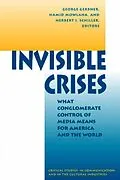According to the contributors to this volume, the communications media deliberately blank out critical conditions and developments whose imagery would pose unacceptable challenges to the dominant structures of culture-power. Such "invisible crises" include the suppression of information about the dehumanization and stigmatization of groups of people; the drift toward ecological suicide; the neglect of vital institutions such as public education and the arts; the way in which television corrupts the electoral process; and the promotion of practices which drug, poison and kill. The book asks why the media are, in the view of contributors, withholding vital information from the public, and focuses on the increasing concentration of culture-power that, it is argued, keeps these truths from public view.
Autorentext
George Gerbner is professor emeritus at the Annenberg School for Communication at the University of Pennsylvania. Hamid Mowlana is professor of communication at American University and president of the International Association of Media Research. Herbert I. Schiller is professor emeritus of communication at the University of California at San Diego. George Gerbner is professor emeritus at the Annenberg School for Communication at the University of Pennsylvania. Hamid Mowlana is professor of communication at American University and president of the International Association of Media Research. Herbert I. Schiller is professor emeritus of communication at the University of California at San Diego. George Gerbner is professor emeritus at the Annenberg School for Communication at the University of Pennsylvania. Hamid Mowlana is professor of communication at American University and president of the International Association of Media Research. Herbert I. Schiller is professor emeritus of communication at the University of California at San Diego.
Inhalt
Part 1 Total control: brave new world minus 400, Ben Bagdikian; information deprivation in an information-rich society, Herbert I. Schiller; the hidden side of television violence, George Gerbner; speaking volumes - the book-publishing oligopoly and its cultural consequences, Leah Binder. Part 2 Technocratic fantasies: computer-assisted crimes, Rick Crawford; freedom, fun and fundamentals - defining digital progress in a democratic society, Nicholas Johnson. Part 3 Gaps that divide us: writing about poverty in the age of plenty, Stanley Meisler; race relations in the suburbs, Rosalyn Baxandall and Elizabeth Ewen; national amnesia, cultural Darwinism and the pursuit of power, or what Americans don't know about Indians, Jerry Mander. Part 4 Global fault lines: beaches without bases, Sue Curry Jansen; the new world intellectual order, Johan Galtung; whose whispers in the gallery?, Erskine B. Childers; the crisis of political legitimacy and the Muslim world, Hamid Mowlana; the crisis of mobility, Nancy Snow. Part 5 The new tyrannies: "let them eat pollution", John Bellamy Foster; the silent war - debt and Africa, Jill Hills; global drug scourge - the hidden story, Stephen E. Flynn.
